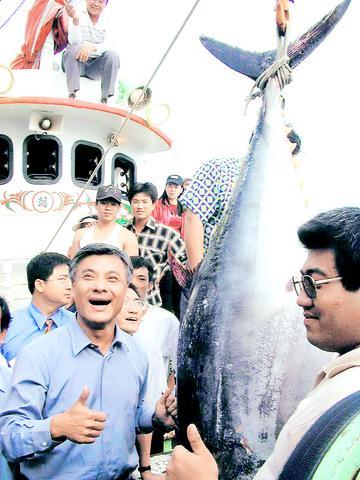Pingtung County Commissioner Su Chia-chuan (
"Due to his extensive political experience, the premier thought Commissioner Su was the best person to fill the vacancy," Cabinet Spokesman Lin Chia-lung (
Su served as a lawmaker between 1993 and 1997, and is serving his second four-year term as Pingtung County commissioner.

PHOTO: WEI BIN, TAIPEI TIMES
Yu Cheng-hsien tendered his resignation on Sunday over the election-eve shooting of President Chen Shui-bian (
According to Lin, both the premier and the president highly appreciated Su's performance over the years and were confident that he would do a good job.
Earlier yesterday morning, Lin told a press conference that the premier would not announce the new minister by May 12, when the premier leads Cabinet officials, including the new interior minister, to resign en masse in accordance with the Constitution that the Cabinet must vacate its posts before the inauguration of the new president. Chen will be sworn in for his second four-year term on May 20.
"Respecting Minister Yu's personal wishes and acknowledging his courage to shoulder the political onus, the premier approved the minister's resignation on the evening of Sunday and is looking for his successor," Lin told the press conference held at the Cabinet yesterday morning.
Lin said that the premier hoped Yu Cheng-hsien would stand fast at his post until the new minister is found.
Yu Cheng-hsien, who was originally scheduled to hold a press conference yesterday morning to officially announce his resignation, decided to take a five-day vacation starting yesterday and ask his secretary to read an announcement.
In the statement, Yu Cheng-hsien said that he offered his resignation verbally on March 19, the day of the attempted assassination, in an effort to assume political responsibility.
He was persuaded by the premier to stay on because of the upcoming presidential election. He then tendered his resignation in writing on Sunday.
Before the dust settled, other possible leading candidates to succeed Yu Cheng-hsien included Minister without Portfolio Yeh Jiunn-rong (
When asked by reporters about his intent to take up the post yesterday, Yeh Jiunn-rong said that it was inappropriate for him to make any comment before the premier approaches him about the matter. He, however, added that he would accept the premier's personnel arrangement.
A Cabinet official who asked not to be named said that it did not sound like a bad idea to have a female interior minister since Chen has vowed on various occasions to see more high-ranking female government officials.
Meanwhile, the National Police Administration (NPA) confirmed yesterday that NPA Director-General Chang Si-liang (
As for who will succeed Chang, Lin said that the question is up to the new minister to decide.
According to the press release made available by the NPA, Chang offered his resignation verbally to his direct supervisor Yu Cheng-hsien on the day of the shooting. He agreed to stay on because of the presidential election and the subsequent mass protests. He told lawmakers and reporters on Sunday that he would submit his resignation yesterday morning to take full responsibility for the assassination attempt.

CHAOS: Iranians took to the streets playing celebratory music after reports of Khamenei’s death on Saturday, while mourners also gathered in Tehran yesterday Iranian Supreme Leader Ayatollah Ali Khamenei was killed in a major attack on Iran launched by Israel and the US, throwing the future of the Islamic republic into doubt and raising the risk of regional instability. Iranian state television and the state-run IRNA news agency announced the 86-year-old’s death early yesterday. US President Donald Trump said it gave Iranians their “greatest chance” to “take back” their country. The announcements came after a joint US and Israeli aerial bombardment that targeted Iranian military and governmental sites. Trump said the “heavy and pinpoint bombing” would continue through the week or as long

TRUST: The KMT said it respected the US’ timing and considerations, and hoped it would continue to honor its commitments to helping Taiwan bolster its defenses and deterrence US President Donald Trump is delaying a multibillion-dollar arms sale to Taiwan to ensure his visit to Beijing is successful, a New York Times report said. The weapons sales package has stalled in the US Department of State, the report said, citing US officials it did not identify. The White House has told agencies not to push forward ahead of Trump’s meeting with Chinese President Xi Jinping (習近平), it said. The two last month held a phone call to discuss trade and geopolitical flashpoints ahead of the summit. Xi raised the Taiwan issue and urged the US to handle arms sales to

BIG SPENDERS: Foreign investors bought the most Taiwan equities since 2005, signaling confidence that an AI boom would continue to benefit chipmakers Taiwan Semiconductor Manufacturing Co’s (TSMC, 台積電) market capitalization swelled to US$2 trillion for the first time following a 4.25 percent rally in its American depositary receipts (ADR) overnight, putting the world’s biggest contract chipmaker sixth on the list of the world’s biggest companies by market capitalization, just behind Amazon.com Inc. The site CompaniesMarketcap.com ranked TSMC ahead of Saudi Aramco and Meta Platforms Inc. The Taiwanese company’s ADRs on Tuesday surged to US$385.75 on the New York Stock Exchange, as strong demand for artificial intelligence (AI) applications led to chip supply constraints and boost revenue growth to record-breaking levels. Each TSMC ADR represents

State-run CPC Corp, Taiwan (CPC, 台灣中油) yesterday said that it had confirmed on Saturday night with its liquefied natural gas (LNG) and crude oil suppliers that shipments are proceeding as scheduled and that domestic supplies remain unaffected. The CPC yesterday announced the gasoline and diesel prices will rise by NT$0.2 and NT$0.4 per liter, respectively, starting Monday, citing Middle East tensions and blizzards in the eastern United States. CPC also iterated it has been reducing the proportion of crude oil imports from the Middle East and diversifying its supply sources in the past few years in response to geopolitical risks, expanding